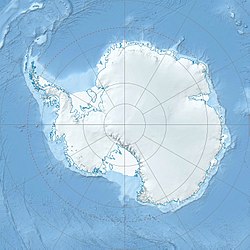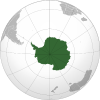Port Martin
Port-Martin | |
|---|---|
 Antarctic coastline near the station | |
| Coordinates: 66°49′10″S 141°23′30″E / 66.8194°S 141.3917°E[1] | |
| Region | Adélie Land |
| Location | Cape Margerie |
| Established | 20 January 1950 |
| Destroyed | 23 January 1952 |
| Named for | André-Paul Martin |
| Government | |
| • Type | Administration |
| • Body | French Antarctic Expedition |
| Active times | All year-round |
Port Martin, or Port-Martin, is an abandoned French research base at Cape Margerie on the coast of Adélie Land, Antarctica, as well as the name of the adjacent anchorage.
History
[edit]The site was discovered in 1950 by the Fifth French Antarctic Expedition under André-Frank Liotard and a landing made on 18 January 1950. The base was established by Liotard and a team of 11 men who raised the main building with several annexes to house scientific activities. It was named for expeditioner André-Paul Martin (aka J.A. Martin), originally second-in-command of the group, who had died of a stroke off South Africa as the expedition was en route to the Antarctic.[2]
On 6 January 1951 the base team was relieved by 17-member team under the leadership of Michel Barré. Over the following year they enlarged the main building while continuing the research program. They, in turn, were relieved on 4 January 1952 while a smaller team of seven, led by Mario Marret, built a secondary base on Petrel Island, some 60 kilometres (37 mi) to the west in the Géologie Archipelago.[2]
On the night of 23–24 January 1952 the Port Martin base was largely destroyed by a fire which burnt down its main building. There were no deaths nor injuries incurred but the base personnel were evacuated to Petrel Island, where they overwintered, and Port Martin abandoned.[2]
Historic site
[edit]Since 1952 the site has remained largely undisturbed. What remains in Port-Martin are the base's ancillary buildings, including a weather shelter and its coal and supply sheds, beneath a covering of snow. It represents an optimal site to design archeological methods and techniques in extreme climatic conditions. It is considered a valuable archaeological as well as a historic site and is protected under the Antarctic Treaty System as Antarctic Specially Protected Area (ASPA) No.166.[2] It has also been designated a Historic Site or Monument (HSM 46), following a proposal by France to the Antarctic Treaty Consultative Meeting.[3]
See also
[edit]References
[edit]- ^ "Port-Martin". SCAR Composite Gazetteer of Antarctica. Australian Antarctic Data Centre. Retrieved 3 March 2024.
- ^ a b c d "Port Martin, Terre Adelie" (PDF). Management Plan for Antarctic Specially Protected Area No. 166: Measure 1, Annex G. Antarctic Treaty Secretariat. 2006. Retrieved 2013-01-30.
- ^ "List of Historic Sites and Monuments approved by the ATCM (2012)" (PDF). Antarctic Treaty Secretariat. 2012. Retrieved 2014-01-02.
![]() This article incorporates public domain material from "Port Martin". Geographic Names Information System. United States Geological Survey.
This article incorporates public domain material from "Port Martin". Geographic Names Information System. United States Geological Survey.

